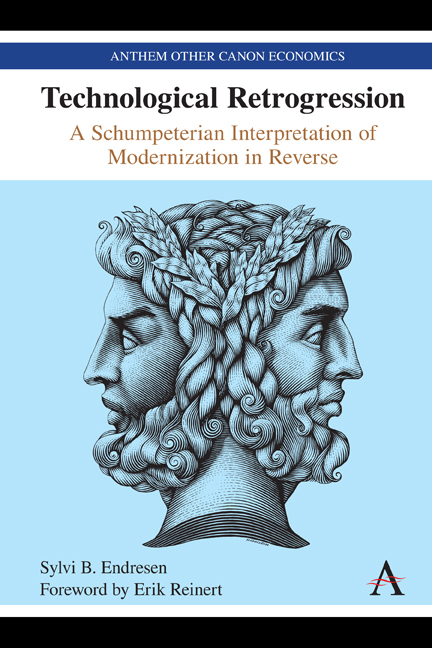Book contents
- Frontmatter
- Dedication
- Contents
- List of Figures
- Foreword
- Acknowledgements
- Preface: The Book within This Book
- Introduction: The Concept of Technological Retrogression
- 1 Challenging Linearity and Irreversibility
- 2 Perspectives on Technological Heterogeneity
- 3 Production Systems and Work Histories
- 4 Empirical Evidence of Technological Retrogression: The Sri Lankan Case
- 5 Empirical Evidence of Technological Retrogression: The Malaysian Case
- 6 A Theory of Technological Retrogression
- References
- Index
2 - Perspectives on Technological Heterogeneity
Published online by Cambridge University Press: 17 June 2021
- Frontmatter
- Dedication
- Contents
- List of Figures
- Foreword
- Acknowledgements
- Preface: The Book within This Book
- Introduction: The Concept of Technological Retrogression
- 1 Challenging Linearity and Irreversibility
- 2 Perspectives on Technological Heterogeneity
- 3 Production Systems and Work Histories
- 4 Empirical Evidence of Technological Retrogression: The Sri Lankan Case
- 5 Empirical Evidence of Technological Retrogression: The Malaysian Case
- 6 A Theory of Technological Retrogression
- References
- Index
Summary
Understanding time– space edges
The Asian societies I have studied were characterized by coexistence of technologies at very different productivity levels. Then how is such technological heterogeneity understood in theory? The most general conception concerns processes in the field of tension formed when phenomena which originate in different societies meet. In Giddens's (1984) terms, such encounters form time– space edges, which may be defined as ‘critical interfaces of historical and geographical transition’ (Spengen 1992, 7). Connections between societies of different structural types ‘may be conflictual as well as symbiotic’ (Giddens 1984, 377). The fishing societies I have studied have all experienced dramatic encounters when technologies originating in the West were introduced in the low- technology settings. While searching for an understanding of the outcomes in terms of structural change, I try to find out which – if any – explanations are offered to the unexpected technological changes I came across. What explanations to the processes where modernization seems to reverse can be detected in the general development debate?
When outlining how central theorists understand structural properties of technologically heterogeneous societies, the discussion by necessity attains a very general character. Should technologically heterogeneous societies be considered dual societies, as suggested by modernization theorists; are they composed of two different sectors, a traditional and a modern? Then technological heterogeneity indicates an incomplete modernization process, caused by lack of capital for further technological modernization or by traditional attitudes towards modernization in the population. Alternatively, are the producers that are pushed out of modern production less productive? In general, when explained in the spirit of modernization theory, technological changes which do not confirm to the ideal (Western) model are transitional problems, bound to disappear when market forces have fully penetrated the economy.
By appearance, technological retrogression is the rejection of modern technology; by substance, however, it is a strategy of the exploited and marginalized poor to uphold their standard of living. When faced with the inadequacy of modernization theory to explain my empirical findings, I approached radical schools of economic thought.
The transition of various pre- capitalist modes of production into the capitalist one has been central in the Marxist development debate for more than a century. But the main concern has been the transition process within Western societies: the emergence of the capitalist mode of production, internal changes caused by it and its dominance in the Western world.
- Type
- Chapter
- Information
- Technological RetrogressionA Schumpeterian Interpretation of Modernization in Reverse, pp. 23 - 76Publisher: Anthem PressPrint publication year: 2021

